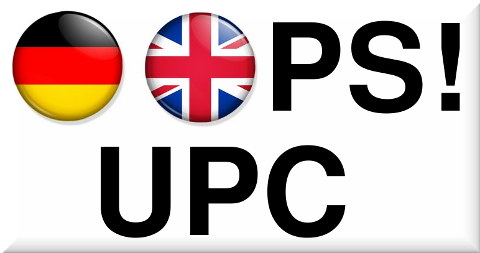

 Summary: IAM Media or IAM Magazine seems so focused on trying to help the UPC that it neglects to do its work, which would be fact-checking (but IAM is just a lobbyist/think tank disguised as an impartial media organisation)
Summary: IAM Media or IAM Magazine seems so focused on trying to help the UPC that it neglects to do its work, which would be fact-checking (but IAM is just a lobbyist/think tank disguised as an impartial media organisation)
THE management of the EPO loves IAM and it's easy to see why. The management's PR apparatus, which they had paid over a million euros, passed money to IAM, specifically for UPC lobbying.
Just over a week ago the UK made a bizarre announcement which we have since then written about in the following posts:
All the above comments show that there is necessary step which has not been taken: ask the CJEU if the UPCA as it stands is a court common among EU member states like the Benelux court. This was done with EPLA, but not with the UPCA. One simply wonders why? It should certainly have been done after the Brexit vote.
If the answer is negative, that is, the UPCA is an international court, not embedded in the EU legal system, then we will know for sure that the UP and the UPCA is dead.
If the answer is positive, that is the UPCA is a court common among EU member states, then the 29.03.2018 will play an important role.
It will then follow logically that UK cannot any more participate in the UPCA, if the supremacy of Union law and the involvement of the CJEU is denied by the UK. Politically it looks like this is the most probable option.
If the intention of the UK is to stay in the UPCA post-Brexit, is high time to decide on all outstanding questions for instance with respect to enforcement, liability of the court and the member states, etc...
Even the Pascoe report showed the numerous difficulties and hurdles which have to be taken for a post-Brexit participation. Also, staying in the EU customs union is not enough to insure post Brexit participation of the UK.
There are to many guesses and uncertainties about the possible post Brexit participation of UK in the UPCA, that it appears highly probable that all those questions will not be dealt with before 20.03.2019. and even before the 31.12.2020.
How can it be that learned lawyers and legal scholars accept to stay in such an unclear situation? Up to now I have not heard any concrete answer to those many important questions. So even if the UPCA enters into force with the UK, the only reasonable option is to opt-out!
And the "German" problem does not look to be solved in a few weeks. Banking on a quick decision of the GFCC is illusory. There are many other requests to be dealt with before the one on the UPC arrives on top of the pile. Even for a decision on its admissibility. There are also some requests about the EPO and its boards of appeal. Without a reply on those, no reply on the UPC.
The mere ratification of the UPCA, on top of it with a reservation about the legal personality of the UPC, is meaningless and does not solve any problem. On the contrary it makes all the problems more manifest.
To get greater clarity on where things go from here, I spoke once again to Bristows partner Alan Johnson, who has followed the long and often tortuous progress towards the creation of a single European patent regime as closely as anyone. And his message was unambiguous: the UPC is coming, it is going to include the UK and it is highly likely that it will be up and running by the end of 2020.
While the world eagerly watches the development of India’s software industry, the confusion regarding software patents in the global IT hub remains considerable. This is despite – or perhaps because of – the three attempts by the Indian Patent Office (IPO) to establish guidelines on computer-related inventions (CRIs), each of which has provoked questions, criticism and controversy. The IPO released its latest CRI examination guidelines on June 30 2017; this chapter looks into the evolution of the guidelines, from the first set to the third, as well as the effects that they have had.
[...]
As would be expected, the guidelines generated controversy, attracting much feedback and many representations from stakeholders. A joint letter to the prime minister’s office demanding the total recall of the guidelines by the Software Freedom Law Centre, with significant others, made the following counter-argument regarding the legislative intent:
However, the 2015 Guidelines overlook one crucial development viz the unsuccessful attempt made by the Patents (Amendment) Bill, 2005 [drawing from the Patents (Amendment) Ordinance 2004] to amend Section 3(k) and extend patentability to computer programs with ‘technical application to industry’. When laid before the Parliament, the proposed amendment faced objection on the ground that it would result in the creation of monopolies by multi-nationals (as stated in a press release dated 23/3/05), and was subsequently deleted. This demonstrates a clear legislative intent against broadening the patentability of computer programs.